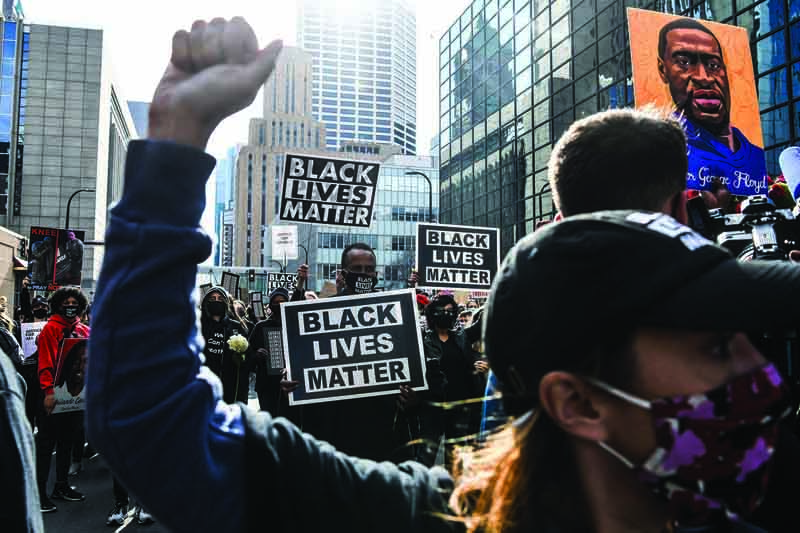 MINNEAPOLIS: Demonstrators hold placards during the "I Can't Breathe - Silent March for Justice" in front of the Hennepin County Government Center.-AFP
MINNEAPOLIS: Demonstrators hold placards during the "I Can't Breathe - Silent March for Justice" in front of the Hennepin County Government Center.-AFP
MINNEAPOLIS: Deeply wounded and forever changed by the death of his nephew George Floyd, Selwyn Jones is apprehensive about the trial started yesterday of the police officer charged with his murder, his doubts fueled by a legal system that historically has been friendly to law enforcement. "I want justice to prevail," said Jones, a maternal uncle to the Black man whose death under the knee of white Minneapolis officer Derek Chauvin sparked outraged protests around the world. "I obviously want conviction," Jones told AFP. But he said he worries about "the system."
Chauvin, who kept his knee on the neck of the prostrate Floyd for nearly nine minutes on May 25, 2020, faces murder and manslaughter charges in the trial in a Hennepin County district court, where jury selection began yesterday. The 55-year-old Jones, who lives in the small town of Gettysburg, South Dakota, hundreds of miles to the west, said he hopes to attend part of the trial, though social distancing rules imposed by the COVID-19 pandemic mean only one family member can attend at a time. To him, the video of the fateful episode-filmed by a passerby and now seen by millions around the world-left no doubt: Chauvin is "guilty as hell." When Jones first saw the video on television, he didn't know who the Black man was lying facedown under a police officer's knee.
"Damn," he said he thought at the time, "that gonna kill this dude!" When his distraught sister called him with the news, Jones said, it was as if someone had "put their hands through my chest and ripped my heart out." He said he could never forget the images of his nephew begging for his life-and gasping for air as he predicted his own death. As for Chauvin, he said, "he acted like there was nobody around him," even as a gathering crowd implored him to let Floyd breathe. Jones said it was as if Chauvin told himself, "I can do whatever I want to, because I am a police officer, and I am a white man and we rule in the world."
'Manipulate the system'
Despite the powerful nature of the video, Jones is not optimistic about the outcome of the trial, which is expected to last several weeks. He said "technicalities"-including laws that give police officers considerable legal immunity-can be used "to manipulate the system to their way." "You've seen things like this happen over time, and they never worked out the way that they were supposed to." The most glaring example, he said, was the 1992 beating by Los Angeles police of a Black man, Rodney King following a high-speed chase. Despite a clear video record of the prolonged beating, a jury acquitted three of the officers involved and reached no verdict on the fourth.
That outcome led to six days of bloody rioting in African-American and Latino neighborhoods that left 63 people dead-a scenario Jones fears could be repeated if Chauvin escapes prison. "If there's an acquittal the whole world is gonna be tore up," he said. "I hate rioting, but sometimes that's the only way that people understand." The circumstances surrounding his nephew's death, and the huge protests it spawned, do give Jones some hope. "Just by chance, my nephew's death had to be in the middle of a pandemic, with everybody in the world (having) that opportunity to see what racism looks like," he said.
"Because that's what it was all about-racism, power and control. The same thing that has been inflicted upon Black people for hundreds of years." "The only reason" Chauvin was arrested, Jones said, "is because people were sick and tired of being sick and tired." New protests are planned around the Government Center where the trial is being held-opening arguments are set for March 29 -- and huge media attention is guaranteed. With "so much pressure on this case to do something," Jones said, he does hold at least a bit of hope. - AFP
.jpg)



